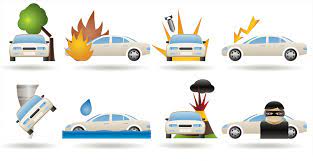Comprehensive insurance, often referred to as "comp" insurance, is a type of auto insurance coverage that provides protection for a wide range of non-collision-related damages to your vehicle. It is designed to help policyholders recover the costs associated with events that are typically beyond their control. Comprehensive coverage is an optional component of an auto insurance policy and is usually purchased in addition to the mandatory liability coverage required by law.
Comprehensive insurance typically covers the following types of damages or losses:
Damage from Natural Disasters: This includes damage caused by events like earthquakes, floods, hurricanes, tornadoes, and wildfires.
Theft: If your vehicle is stolen, comprehensive insurance can help cover the cost of the vehicle's replacement or repair.
Vandalism: Damage resulting from acts of vandalism, such as broken windows or graffiti, is covered.
Animal Collisions: Comprehensive insurance can cover the cost of repairs if your vehicle is damaged in a collision with an animal, such as a deer or a moose.
Falling Objects: If your vehicle is damaged by falling objects, like tree branches or hail, comprehensive coverage can help pay for repairs.
Fire Damage: Damage from fires, whether due to arson or natural causes, is included in comprehensive coverage.
Broken Glass: If your vehicle's glass (e.g., windshield) is damaged, comprehensive insurance can cover the cost of repair or replacement.
Civil Disturbances: Damage resulting from civil disturbances, such as riots or civil unrest, is typically covered.
It's important to note that comprehensive coverage is distinct from collision coverage, which covers damages resulting from accidents with other vehicles or objects. Together, comprehensive and collision coverage are often referred to as "full coverage."
When purchasing comprehensive insurance, policyholders can choose a deductible amount. The deductible is the portion of a claim that the policyholder is responsible for paying out of pocket before the insurance coverage kicks in. Higher deductibles often result in lower premiums, while lower deductibles mean the policyholder will pay less out of pocket in the event of a claim.
Comprehensive coverage can be valuable for individuals who want to protect their vehicles against a wide range of potential risks and damages. The specific terms, coverage limits, and premiums for comprehensive insurance can vary between insurance companies and policies, so it's important to review the details of your policy to understand what is covered and any limitations. If you are near either Fort Collins or Windsor visit our office and we can help you find the coverage that you need. Or if that is inconvenient feel free to give us a ring.
